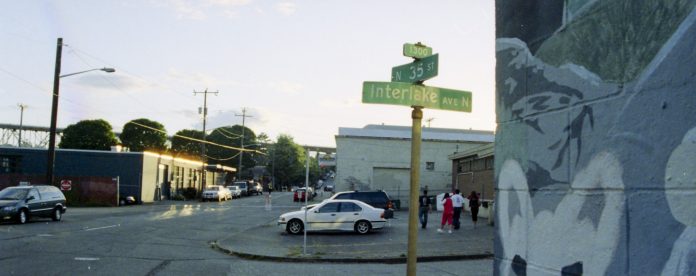“How’s it goin’, old school,” said one man to another.
They shared in the brotherhood of being tall, a slow-hipped swagger from the American past, two dark-skinned street denizens born before the microwave. They were the generation that saw Vietnam come home and remembered the days before computers. I wondered if they might have been– like me– more at home amongst the earthy grit of Aurora than marooned out here on Greenwood.
But here we were.
I like listening to other people talk. It goes without saying that I learn more from listening than talking, but I definitely learn more when I’m not even part of the conversation, and have the luxury of eavesdropping. The one with the fedora and ear piercings spoke to the fellow with the stylish cane, giving a soliloquy I found poignant. Mr. Stylin’ Cane had just commented on another of the many new apartment buildings lately sprouting* out of the ground, unaffordable to most and eyesores to architects the world over. Mr. Fedora sighed wistfully.
“It’s fa sho changin’, you got that right. Like our parents used to say, cain’t even recognize this place. But hey. We’s the old folks now, talkin’ ’bout the old days. You know back in the day, the old Seattle, how it used to be? The way stuff looked, how it was? And you’d see people around, but you was never really friends wit’ ’em? But you see ’em now and it feels like they are?”
The storytelling pause. He continued.
“‘Cause you and them both know how it used to be. It’s so different now. But man, you see their face and it feels like everything’s A-okay, maybe jus’ fo’ a minute. ‘Cause they understand you. They got memories you also got.”
I realized then that this was his way of naming his listener as one of these very folks, someone never really a friend but a friend now, because here we were tonight, marooned not just on Greenwood but more potently in the future. Here we were, together.
“I know just what choo mean,” the listener replied. “Ah get that feelin’ all the time.”
Which meant, of course, the same in return. They say women always mean more than they say, while men say exactly what they mean. But when it comes to emotions, anything sensitive, men, raised as they are to suppress feelings, to pretend against delicacy and matters of the heart… Well, they speak in code as much as anyone else. The bald and unvarnished truth of the listener’s response might really be something more like this:
Thank you for being you, and being here. Because it makes me feel like myself.
Which he definitely didn’t say. But that doesn’t mean he didn’t mean it.
—
*Like everything to do with housing, this is more complicated than it sounds. An interesting comparison with Vienna’s housing solutions here, courtesy our Mike Eliason.
Nathan Vass is an artist, filmmaker, photographer, and author by day, and a Metro bus driver by night, where his community-building work has been showcased on TED, NPR, The Seattle Times, KING 5 and landed him a spot on Seattle Magazine’s 2018 list of the 35 Most Influential People in Seattle. He has shown in over forty photography shows is also the director of nine films, six of which have shown at festivals, and one of which premiered at Henry Art Gallery. His book, The Lines That Make Us, is a Seattle bestseller and 2019 WA State Book Awards finalist.


